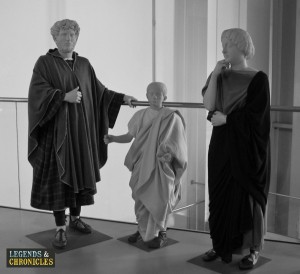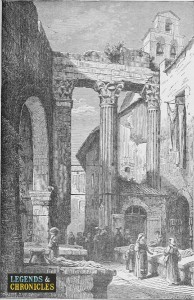Life in Ancient Rome
Ancient Rome was a civilisation that took birth in the Italian peninsula and then expanded from there to the three continents of Europe, Asia, and Africa. It began in the 8th century BC and soon became a republic, eventfully becoming an empire with Augustus Caesar as its first emperor. Life in Ancient Rome was different for different kinds of people. In the towns, public baths were an important place to socialise with other people. Most of the people in the country side were farmers and a good part of their daily life was spent harvesting and taking care of their crops. Similarly, merchants in the towns spent most of their day trying to sell their products and travelling to different parts of the empire.
The history of life in ancient Rome can be traced to around 753 BC, although the founding of Rome is derived from the mythological characters of Romulus and Remus. Archaeological evidence has suggested that the village of Rome was founded sometime in the 8th century BC and that can be taken as a starting point for life in ancient Rome. Initially, of course, life in ancient Rome was much simpler but became more complex and multi-faceted with the expansion of the kingdom. The system of elected representatives was established in Rome around 509 BC and it became a republic.
Family life in ancient Rome
Family was taken as the unit of social life in ancient Rome and was important to the Romans. The Father was considered the head of the family and he had all the power in the family. In the upper classes, servants and slaves were also considered part of the household. The father had the right to punish any member of the family, claim the property of his dependants as his own, and even sell his children into slavery. The wife usually had say in some matters, particularly the matters of household finances. Children were usually taken care of by mother or by some elder relative. It was common for people to marry in their late teens or early twenties.
Ancient Rome culture and customs
The city of Rome was the cultural centre of life in ancient Rome. The city was rich in architecture and had a culture of theatres, baths, gymnasia and brothels. Given the efficient transportation technology of ancient Rome, there was constant contact between different provinces of the empire and thus cultural assimilation took place. The cultural and religious practices of the Romans including architectures, religious temples, festivals, and other aspects were brought to distant areas including North Africa and Eastern Europe.
Roman literature and philosophy was heavily influenced by the Greeks and with the passage of time, rich works of art, literature, philosophy, and poetry were produced by this civilisation, examples of which still exist today in some form.
Life in ancient Rome was rich with traditions and customs in every important domain of life. Various rites were observed and festivals celebrated in the honour of ancient gods. Family life included the extended family with the oldest male acting as the head of the family. Children were given education in reading, writing, mathematics, and other subjects from scrolls and books. Divorce was very rare in ancient Roman life and thus a great deal of care was taken in choosing the partner.
Life of the rulers in ancient Rome
Augustus Caesar is considered the first Roman Emperor who ruled the empire from 27 BC to 14 AD. He was followed by Tiberius, Caligula, and Claudius. After that followed the reign of Nero who is known for burning Rome. Vespasian was the next emperor who built the Colosseum which was to become one of the most important architectural wonders of the Empire for ages to come.
One of the most famous Roman Emperors was Justinian who is famous for creating a unified code of laws for the Empire. He ruled the Eastern Roman Empire after the western side of the empire had fallen to the barbarians in 476 AD. The emperors naturally led lavish lifestyles given their supreme importance and status in the Roman empire.
Life of ordinary people in ancient Rome
Life in ancient Rome for the common people was quite active particularly in the urban centres. People had a lot of activities such as festivals, public baths, theatres, and others. But the Empire was very diverse and there were many regions of the Empire where Latin was not spoken and the local people continued to follow their customs and traditions. The most important profession of the common people was of course agriculture but trade also flourished in the urban centres and ports. Slaves were important part of life in ancient Rome and common people who could afford them bought them for the upkeep of their own household and other work. However, Rome did not invest too much in the intellectual life of the common people and this became an important reason of its downfall.
The life of Roman peasants & slaves
Life in ancient Rome for slaves and peasants was harsh, particularly for the former. Slaves virtually had no rights under the Roman Republic but with the passage of time and the assimilation of the high Greek culture, slaves were given certain rights. Other than manual works, salves were also used as assistants in trade and could work as book copyists, jewellers, and for other tasks. There were even educated slaves who could act as secretaries and librarians. Slaves were also paid wages for their services and some even had property rights. Most importantly, slaves were employed to help their masters with the agricultural work.
Summary of life in Ancient rome
Ancient Rome went through three main stages of kingdom, republic, and empire. Through these stages and over the centuries, several political, religious, and cultural changes were brought about in Rome. Life in ancient Rome was full of activities in the main urban centres but was very diverse and different in the far-flung areas of the empire. Major cities were rich in architecture, theatres, baths, and other centres of activities. After the conquest of Greece by Rome, Greek philosophy and literature had an important impact on the intellectual life of ancient Rome. Marriage life was important to Romans and slaves had crucial part in running the economy of the empire.

